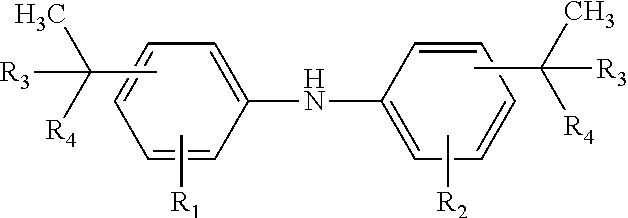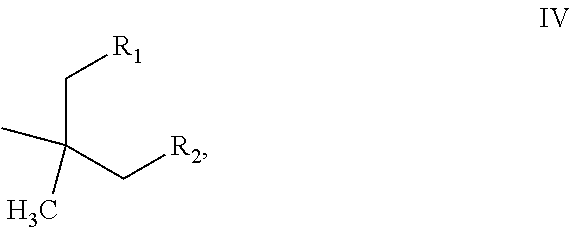Diaryl amine antioxidants prepared from branched olefins
- Summary
- Abstract
- Description
- Claims
- Application Information
AI Technical Summary
Benefits of technology
Problems solved by technology
Method used
Image
Examples
example 1
[0058]To a 3 neck flask equipped with stirrer, thermocouple, and a glass spacer topped with a short path condenser was charged 168.53 g 2-butyl-1-octanol, and 4.03 g dried FILTROL 20× acidic clay catalyst. The mixture was heated to 160° C. with stirring and the pressure was reduced to 240 torr., and product was collected via distillation. Once distillation commenced the pressure was reduced to 160 torr over 20 minutes and the pot temperature fell to 135 ° C. After 2 h the system was cooled under vacuum. The two phase distillate was cooled causing the aqueous portion to freeze, i.e., placed in a commercial freezer overnight, and the organic portion was decanted. The aqueous phase was allowed to thaw and an additional 2 mL of organics were recovered and combined with the main organic portion to yield 88.28 g of a mixture of three C12 olefin isomers in roughly equal amounts, see table.
examples 2-6
[0059]Following the general procedure of Example 1, and adjusting the temperatures and pressures according to the volatility of the products, the alcohols of examples 2-6 were heated in the presence of FILTROL 20× acidic clay catalyst at the temperatures shown to produce a mixture of olefins V, Va and Vb
VVaVbExam-StartingpleAlcoholTemp ° C.ProductR1R212-butyl-1-135-160branched C12n-propyln-pentyloctanololefins22-hexyl-1-185-250branched C16n-pentyln-heptyldecanololefins33,7-dimethyl-135branched C10 methyl*3-methyl-3-octanoland C20 olefinsbutyl*42-Et-1-158branched C8methyln-propylhexanololefins52-Et-1- 80-150Branched C6methylmethylbutanololefins62,4-dimethyl- 80-1502,4-dimethyl-HIso-propyl3-pentanolpentenes*in Example 3 a portion of the material dimerized, the values for R1 and R2 arefor the non-dimerized C10 product.
[0060]Alkylation of Diphenylamine
example 7
[0061]Alkylation of Diphenylamine with the Branched C8 Olefins of Example 4
[0062]Diphenylamine and the mixture of C8 olefins of Example 4 were reacted at 125° C. under standard alkylation conditions in the presence of AlC13 to yield after work-up an alkylated diphenylamine mixture containing, by gc analysis: 92% 4,4′ bis(1-ethyl-1-methylpentyl)DPA; 4% 2,4,4-tris(1-ethyl-1-methylpentyl)DPA; 4% 2,4 bis(1-ethyl-1-methylpentyl)DPA. 8% of the mixture was ortho-alkylated product.
PUM
| Property | Measurement | Unit |
|---|---|---|
| Percent by mass | aaaaa | aaaaa |
| Magnetic field | aaaaa | aaaaa |
| Fraction | aaaaa | aaaaa |
Abstract
Description
Claims
Application Information
 Login to View More
Login to View More - R&D
- Intellectual Property
- Life Sciences
- Materials
- Tech Scout
- Unparalleled Data Quality
- Higher Quality Content
- 60% Fewer Hallucinations
Browse by: Latest US Patents, China's latest patents, Technical Efficacy Thesaurus, Application Domain, Technology Topic, Popular Technical Reports.
© 2025 PatSnap. All rights reserved.Legal|Privacy policy|Modern Slavery Act Transparency Statement|Sitemap|About US| Contact US: help@patsnap.com



